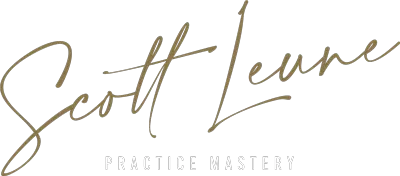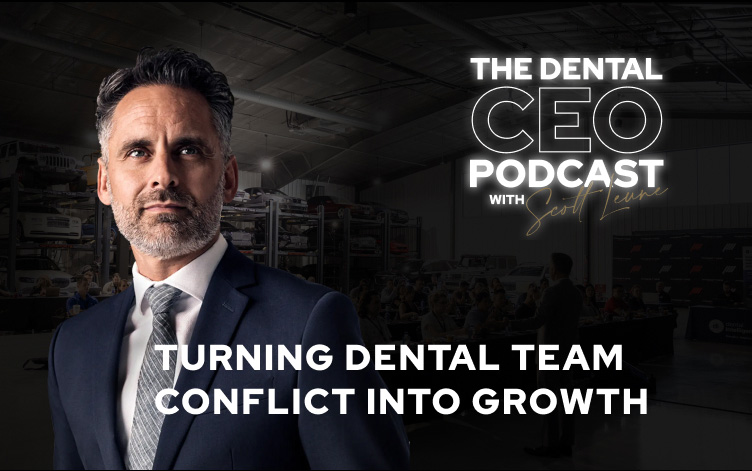Turning Dental Team Conflict into Growth: Dr. Scott Leune and Gabe Karp on Mastering Healthy Conflict
Conflict in a dental practice can drain energy, damage morale, and stall growth—or it can become the spark that drives stronger leadership, better communication, and a more capable team. In this episode of The Dental CEO Podcast, host Dr. Scott Leune sits down with conflict expert Gabe Karp to unpack why conflict doesn’t have to be feared. Together, they explore how dental leaders can reframe tense moments, manage expectations with clarity, and build a culture where challenges are addressed openly—before they grow into deeper problems.
Inside This Episode: Conflict as a Catalyst for Practice Growth
The Dental CEO Podcast delivers practical, actionable strategies for dental practice management, dental leadership, and dental team management.
In Episode 23, Scott and Gabe focus on the realities of conflict in the dental setting. Rather than teaching how to avoid it, they show why leaning into difficult conversations can be one of the most effective leadership tools a dentist has. Listeners learn how to:
- Spot the difference between productive conflict and destructive drama.
- Address issues before they become morale-killing problems.
- Shift the culture from fear of mistakes to ownership and growth.
- Use structured conversations to drive alignment, not division.
By the end, Scott walks away with clear, repeatable strategies any dental leader can use to reduce friction, strengthen accountability, and create a team environment that’s confident, engaged, and willing to improve.
Meet Your Guide: Dr. Scott Leune
As a dentist, entrepreneur, and nationally recognized practice management leader, Dr. Scott Leune has helped thousands of dentists rethink how they run their practices. His approach blends real-world business systems with the human side of leadership—helping doctors balance the demands of growth, patient care, and team harmony. In this conversation, Scott shares not only the interviewer’s role but also his own reflections, connecting Gabe’s strategies directly to everyday dental office scenarios. Explore all of Scott Leune’s webinars
Spotlight on Our Expert Guest: Gabe Karp
Gabe Karp is no stranger to high-stakes conversations. A former trial lawyer who specialized in some of the most contentious cases, Gabe has also scaled tech companies, served as a venture capitalist, and spoken on the TED stage. His book, Don’t Get Mad at Penguins, is a guide to embracing “healthy conflict” as a driver of progress. In this episode, Gabe brings a toolbox of communication frameworks, mindset shifts, and real-world examples that help dental leaders see conflict not as a threat—but as an asset.
Key Takeaways from Dr. Leune’s Perspective
Conflict Isn’t the Enemy – It’s a Sign of a Healthy Practice
Scott knows that avoiding conflict doesn’t make it go away—it just hides it. In dental practice management, buried tension can spread quietly until it undermines trust and performance. Healthy dental leadership means spotting those issues early, encouraging open discussion, and using them as opportunities to improve systems and relationships.
Set Realistic Expectations – Stop Asking Penguins to Fly
Scott believes dental leaders must align expectations with each team member’s true abilities. Expecting someone to thrive in a role that doesn’t match their strengths creates unnecessary frustration. Effective dental team management means assigning tasks where people can succeed and recognizing when a role needs to change—or when the wrong fit must be replaced.
Perfection Creates Fear – Progress Requires Space for Mistakes
Demanding flawless execution can freeze a team into inaction. Scott emphasizes that when mistakes are punished or hidden, decision-making slows, and innovation stops. By treating errors as learning moments—and modeling this behavior himself—he creates an environment where the team feels safe to take initiative.
Debrief Weekly – Make Conflict Part of the Schedule
In Scott’s view, a simple 10-minute debrief meeting each week can transform team dynamics. These sessions invite everyone to share challenges, preventing small problems from becoming big ones. They also normalize constructive conflict, making it a routine part of how the practice operates.
Pre-Brief Before Change – Uncover Roadblocks Early
Before introducing new technology, workflows, or policies, Scott encourages a “pre-brief” discussion. The team brainstorms potential failure points before implementation, turning resistance into collaboration and improving the likelihood of success.
Tackle the Behavior, Not the Person
Scott addresses issues by focusing on how specific actions are perceived, rather than attacking someone’s personality or intentions. This approach keeps feedback constructive, preserves trust, and ensures the conversation leads to improvement rather than defensiveness.
A Mistake Isn’t an Identity – Separate the Act from the Individual
When someone makes a mistake, Scott calls it out clearly but also reaffirms their value to the team. By separating the behavior from the person, he keeps morale intact while still holding people accountable.
Read more useful articles about dental business and dentistry.
Conclusion: From Avoidance to Accountability
For Scott, effective dental leadership isn’t about eliminating conflict—it’s about shaping it into something useful. A conflict-avoidant culture allows resentment and inefficiency to grow unchecked. But when dental practice management embraces healthy conflict, it builds teams that are more accountable, more adaptable, and more capable of delivering excellent patient care. In the end, mastering conflict isn’t just about solving problems—it’s about creating a culture that thrives because of them.

